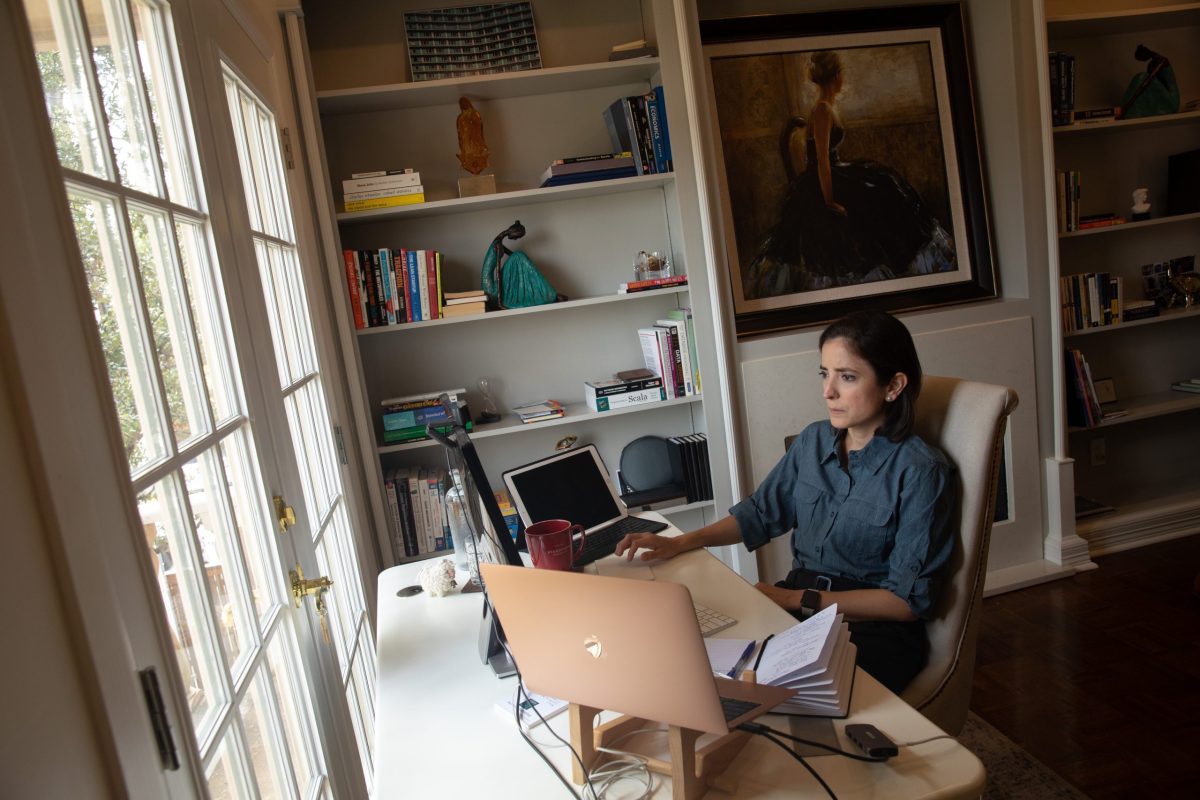How the coronavirus is causing San Antonio companies to rethink office space
Enflux CEO Alejandra Zertuche and her team enjoyed their stylish office off Broadway as they worked to grow the startup. Located next door to the Witte Museum just behind Press Coffee, the education technology company’s headquarters featured an open-air atmosphere accented by glass and cherry wood.
Zertuche and Enflux leaders were preparing to renew their annual lease this past spring when the coronavirus pandemic sent employees home to work. Zertuche and her team decided to let the lease expire.
Since then, Enflux’s 17 employees have been working remotely full time, and Zertuche said now she isn’t sure they will ever return to working in a traditional office space.
“I don’t think we’ll be going back to an office anytime soon,” Zertuche said. “We might get a shared conference space – but maybe not even have that expense. We may host meetings on a cool site where we all get to see each other once a month or so, but working remotely is going so well.”
Daily Zoom calls and shared digital planning tools have helped keep the team connected and on track, Zertuche said.
Zertuche estimates their company has saved 5 percent to 8 percent on expenses – money that’s been reinvested in developing relationships with new clients. The startup integrates and analyzes data for higher education institutions – such as admissions data, surveys, testing software, and curriculum maps – to help colleges and universities see where they can be more efficient.
Enflux is just one of many tech companies nationwide that have decided to downsize or eliminate office space in the wake of the pandemic. With benefits like cost savings, schedule flexibility for employees, and a better work-life balance, corporations such as Twitter, and Pinterest have decided to scrap space and allow many of their employees to work from home indefinitely.
David Heard, CEO of San Antonio tech industry group Tech Bloc, said that even before the pandemic he saw a lot of companies moving to a model where only a handful of employees are required to come into the office while others can work from anywhere.
Heard, who is also the chief marketing officer of SecureLogix, said the local cybersecurity company was one such company that was already in the process of switching to a hybrid model before the pandemic.
“We pretty much collapsed down to one floor earlier this year,” he said.
Formerly, SecureLogix occupied five floors in a Northside building before reducing its office space to three floors, then to two, and now one. Now with most employees working from home, Heard said productivity hasn’t slowed. Tech companies already were realizing the perks of having remote employees before the coronavirus, but the pandemic sped up the adoption process, Heard said.
“This was already happening – [the pandemic] has just locked it in and reinforced it,” Heard said. Overall, Heard estimated the pandemic accelerated the use of existing videoconferencing and communication technology such as Zoom, Google Meet, and Slack by three to five years.
And now that people have tasted the freedom of working from home, “the genie is out of the bottle,” stated Kate Lister, president of consulting firm Global Workplace Analytics.
According to results released in June from a Global Workplace Analytics survey, 76 percent of global office workers and 82 percent of U.S. office workers say they want to continue to work from home at least one day per week.
“If employees got what they wanted, the impact on commercial real estate would be massive,” Lister stated in a press release. “Using back-of the envelope numbers and conservative assumptions, we estimate work-from-home post-COVID-19 could reduce the need for U.S. office space by over a billion square feet.”
NAI Partners Vice President Joe DeCola said while some real estate analysts have predicted dire impacts on the commercial real estate market from the pandemic, he also has seen evidence of a counter-trend: In an effort to prevent spread of the coronavirus, some companies are acquiring more office space to allow employees more room to spread out. NAI Partners is a Houston-based commercial real estate firm that also operates in Austin and San Antonio.
DeCola, a Boerne resident who oversees the NAI Partners offices in San Antonio and Austin, said while remote work may be beneficial for some businesses, many company leaders still see the benefits of having an office space, even if that space is used less.
“A lot of the trends in offices were to create an open environment for more collaboration,” DeCola said. “You don’t always get much of that from over Zoom, so a lot of people are holding their properties. Or if they have some people working remotely, they’re spacing out the folks who are coming in more.”
Scaleworks General Partner Lew Moorman said collaboration is the reason he and other Scaleworks leaders aren’t looking to sublease their downtown offices anytime soon. As a company focused on growing startups, it’s more beneficial for Scaleworks’ smaller company leaders to meet in person and get on the same page, he said.
Scaleworks’ companies have started to gradually bring employees back into the office while others remain at home.
“If you ever tried to have a brainstorming session on Zoom, it does not go well,” Moorman said. “It’s very difficult to do. You always feel like you’re interrupting someone and there’s a lag, and you can’t have free-flowing, open dialogue.”
Moorman said employees have told him they are glad to be back in the office at some capacity, even if it is only a few times a week.
In terms of the local real estate market as a whole, DeCola said the number of companies subleasing their existing space and those leasing new space has remained relatively balanced in San Antonio.
According to an NAI second-quarter report, rent growth has varied across San Antonio’s office space market in the wake of the pandemic. Many office tenants saw rent rates increase or remain the same, while some saw decreases.
The effects of the pandemic on the local commercial real estate market won’t be fully known until more time has passed, DeCola said. Some companies sign multiyear office leases that they may still be locked into and could find it cheaper to hold their property than sublease, he said.
“Once the [COVID-19] vaccine is created, I think that’ll give people a better direction of where we’re going to be,” he said.
Written by Lindsey Arnett
Courtesy of The San Antonio Report

